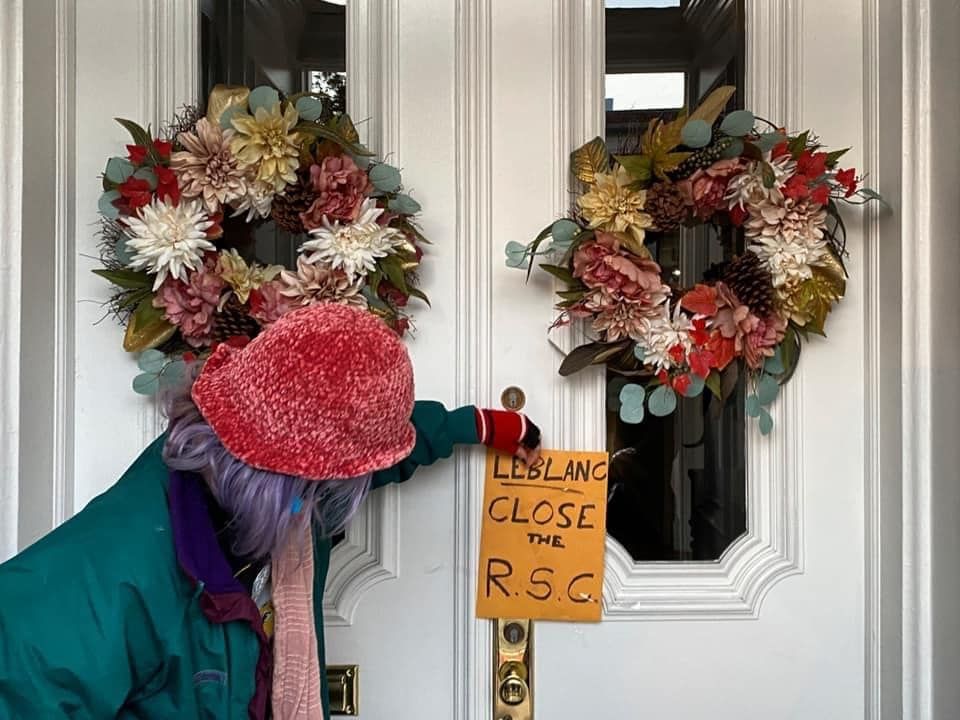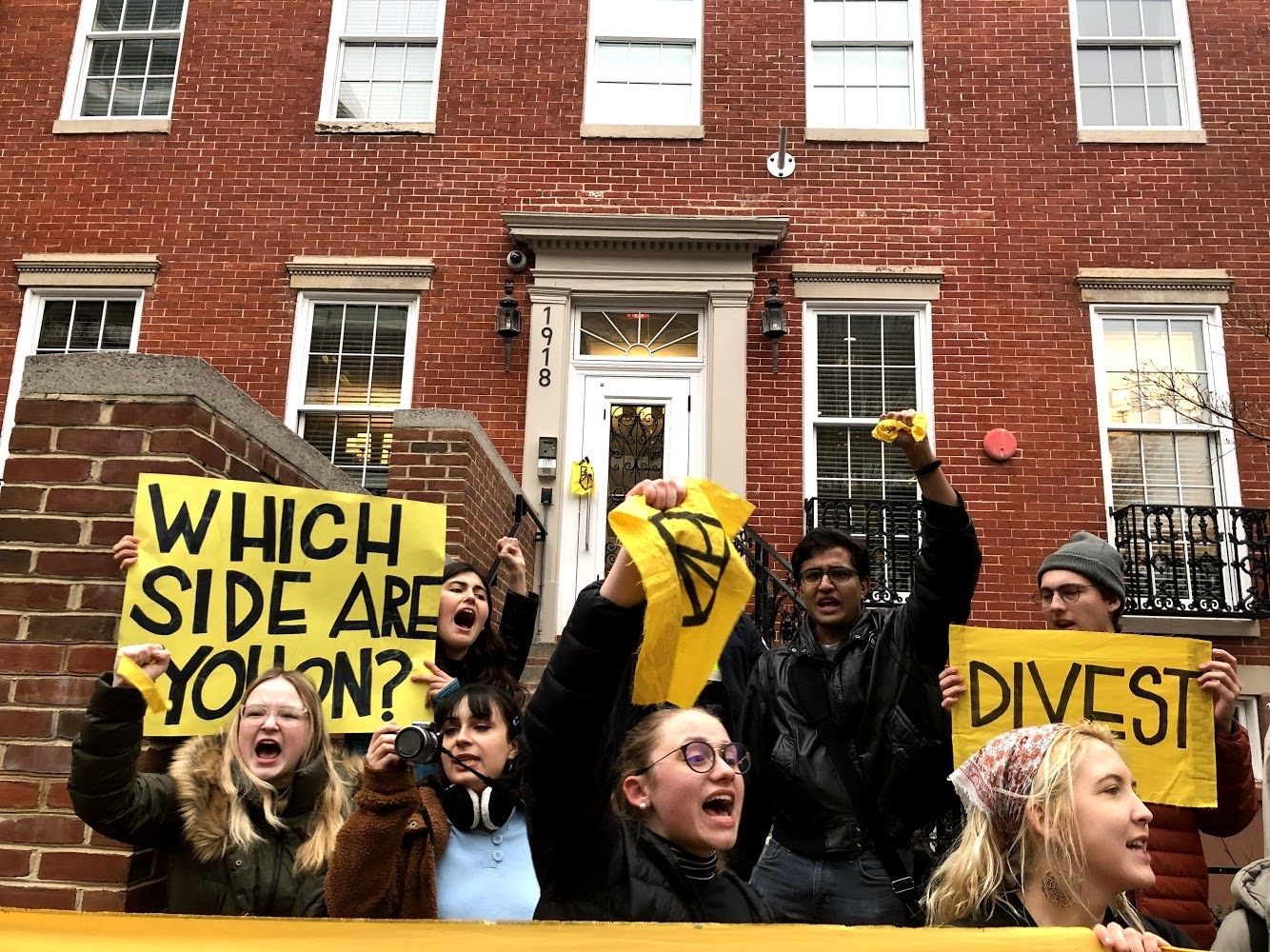Koch-funded climate denial at George Washington University must end now!
By Jasmine Banks, Sophia Halloran | March 5, 2021
 George Washington University student Tess Goddard tapes a letter to university president Thomas J. LeBlanc’s door, asking LeBlanc to close the university's Regulatory Studies Center. Credit: Sophie Gengler
George Washington University student Tess Goddard tapes a letter to university president Thomas J. LeBlanc’s door, asking LeBlanc to close the university's Regulatory Studies Center. Credit: Sophie Gengler
In the midst of a climate crisis, every bit of action counts. That’s why we and other climate activists celebrated this past June, after months of organizing and agitating, when the administration at George Washington University committed to full divestment from fossil fuels, carbon neutrality by 2030, and eventually reversing the university’s entire 200-year carbon footprint. George Washington leadership aligned with science and acknowledged the need for society to transition off of fossil fuels as quickly as possible.
Even with this victory, our work isn’t done. We’re now looking for the university administration to go even further in the name of climate justice.
Despite a commitment to eliminate investment in fossil fuels and a recent pledge to ban single-use plastics, the university continues to lend its name and credibility to climate deniers and efforts to deregulate the fossil fuel industry, by harboring the Koch- and ExxonMobil-funded Regulatory Studies Center. Together, students and others—like UnKoch My Campus, a national nonprofit project organizing against dark money influence from the Koch network—are determined to hold the university accountable until the administration takes a stand against the center. To maintain academic integrity and its commitment to climate justice, George Washington University must close or cut ties with the Regulatory Studies Center, or publicly disclose the center’s funding, motivations, and anti-regulation agenda.
Funded by fossil fuels. The Regulatory Studies Center is an academic center of the Columbian College of Arts and Sciences at George Washington and claims to be an unbiased research institute focused on improving regulatory policy. However, the center has a history of using the university’s name to provide credibility to climate deniers, fossil fuel cronies, and other discredited backers of pseudoscience. In particular, the center has received more than $1 million from both the ExxonMobil Foundation and the Charles Koch Foundation—part of a fossil fuel empire that profits from the deregulation of the industry. Notably, the Kochs and ExxonMobil are prominent architects of the decades-long disinformation campaign fueling climate denial.
The center has almost universally advocated against environmental regulation and relies primarily on researchers with ties to groups funded by the Koch family. The Trump administration acted on many of the center’s polluter-friendly recommendations, such as reducing costs the government attributes to greenhouse gases and raising the bar for issuing new energy efficiency standards.
One year ago, we wrote to the university administration outlining the two ways our school was complicit in the climate crisis: its investments in fossil fuels and its harboring of the Regulatory Studies Center. We wrote out of fear of losing our chance at a livable future, and with the conviction that the university would recognize and correct the dissonance between its academic investment in its students’ futures and its role in the destruction of a chance to live that future.
A broad coalition of students, faculty, alumni, and student and national organizations came together to demand that the university divest from fossil fuels and reckon with the Regulatory Studies Center, because we believe our future is still unwritten. We organized, protested, and voted to deliver the imperative of action in the face of the greatest crisis of our generation. We fought with the conviction that our future will be written by the many, not the few fossil fuel billionaires. And we prevailed. Our university divested from the destruction of our planet and our future.
But our fight isn’t over yet. This year, we have witnessed the consequences of the fossil fuel billionaires’ strategy of delay, denial, and deregulation. Some of us saw the places we call home ravaged by fires, floods, and extreme cold like never before.

Advancing the wrong interests. Our university has played, and continues to play, a significant role in that crisis. George Washington University advances the profit-driven strategies of the fossil fuel elite by giving climate denial a platform and by advancing a deregulatory agenda.
The university not only provides a facade of unbiased integrity, but also proximity and access to powerful decision makers affiliated with the Regulatory Studies Center. The university touts the center’s connections and influence to students and aspiring changemakers it invites to campus. And while this power remains elusive to most students, the Regulatory Studies Center has federal agencies and actors as a captive audience for its fossil fuel-funded recommendations. There is no way to truly know what role these funders play, because the center’s donor agreements lack transparency.
The center erodes George Washington University’s own credibility, devalues students’ degrees, and denies its students a future. Unfortunately, this isn’t the first time Koch money has been used in this way. For years, UnKoch My Campus has followed the trail of Koch funding in higher education to some frightening conclusions. Reports have shown violations of academic freedom and faculty governance that traded donations for influence over faculty hires, curriculum creation, textbook selection, fellowship selections, and so much more. These egregious transgressions weren’t relegated to only one school; they took place at George Mason University, Florida State University, Ball State University, University of Louisville, Clemson University, Utah State University, and more.
We know that divesting from fossil fuels and reckoning with the Regulatory Studies Center alone will not stop the climate crisis, and that no action can end the crisis that has already started. We see ending the corrupting influence of fossil fuel money in higher education as our part to play as students and organizers in the fight for a rapid, just transition to a clean energy future. We are continuing the tradition of George Washington students and community members demanding that the university divest from injustice, and we hope to also create a tradition of shared governance, in which students get a say in what happens at their university.
Ultimately, we hope to win a livable future with clean water, fresh air, and good food—one in which we can prevent, and protect one another from, the worst ravages of this crisis. Future students should not have to be concerned about whether their homes will be underwater or otherwise uninhabitable, or whether they will have a future to live for. We want students to be able to see their futures as their own, liberated from the fear of the worst effects of a crisis yet to come and empowered to pursue their interests, passions, and convictions at universities that uphold academic integrity.
Together, we make the world safer.
The Bulletin elevates expert voices above the noise. But as an independent nonprofit organization, our operations depend on the support of readers like you. Help us continue to deliver quality journalism that holds leaders accountable. Your support of our work at any level is important. In return, we promise our coverage will be understandable, influential, vigilant, solution-oriented, and fair-minded. Together we can make a difference.
Keywords: George Washington University, UnKoch My Campus, climate denial
Topics: Climate Change, Opinion, Voices of Tomorrow

















Students in general want to place their footprint on anything. They want their voice heard. Sometimes they need to understand that the money that they count on may be made by someone who made it in the way they opposed it. Money doesn’t grow on trees. Everyone needs to stop getting their feelings hurt and understand that the companies they go against are the same ones providing them grants. Maybe the company is trying to escape that track and create a different situation to stop what they are doing or having a bad impact on the planet. People need to… Read more »